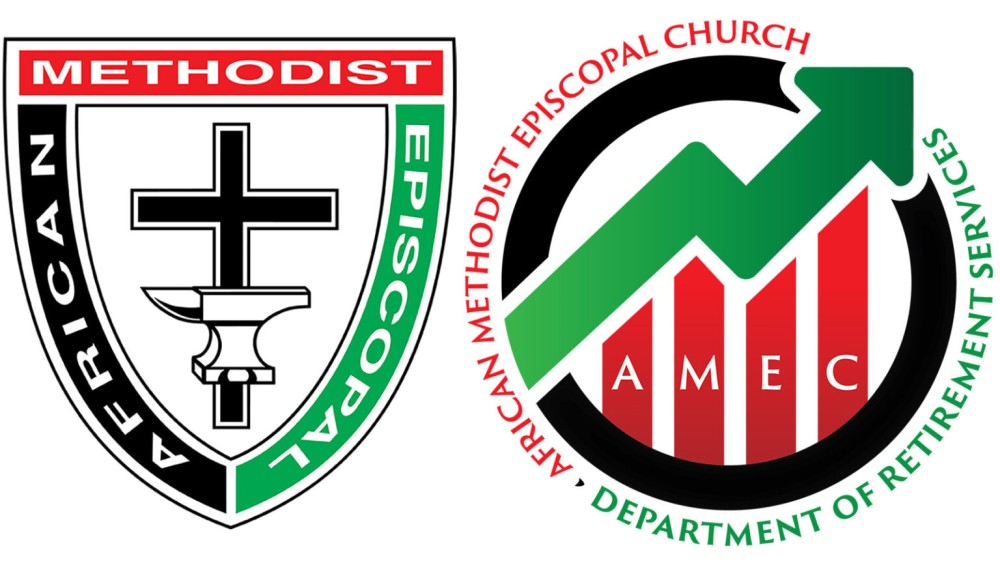AME Church announces retirement settlement agreement during general conference

Logos for the African Methodist Episcopal Church, left, and its Department of Retirement Services, right. (Courtesy images)
The African Methodist Episcopal Church announced a settlement agreement with a number of its clergy who had sued the denomination, accusing it of mishandling their retirement funds.
The settlement, which must still be approved by a judge, came Monday as delegates to the AME Church general conference are meeting in Columbus, Ohio, for their quadrennial meeting that concludes on Wednesday. Prior to and during the meeting, AME Church members were calling for action after the former director of the Department of Retirement Services, Jerome Harris, and others were accused in a 2022 class-action litigation of a total loss of $90 million.
“The agreement reached today demonstrates the Church’s ongoing commitment to its clergy and the determination to hold those truly responsible accountable,” Douglass P. Selby, the AME Church’s general counsel, said in the announcement. “The prayer of the Church is that this settlement, and the reforms to which the Church has committed itself, will help to close a painful chapter in the denomination’s history, and begin the path towards healing and recovery of faith and trust among its members and in the systems of the Church.”
In a separate statement, Selby noted that the settlement agreement applies only to the clergy members’ litigation and not to a separate suit the historically Black denomination filed against Harris, who was accused of embezzling money from retirement accounts. In May, Harris died suddenly of a heart attack.
“The total of the settlement is $20 million,” Selby added. “This is a partial settlement subject to approval of the judge in the class-action case.”
William Rivera, senior vice president of litigation at AARP Foundation, which assisted in the litigation involved in the proposed settlement, hailed the step in the legal process.
“Church employees who served their community for years deserve the retirement funds they were promised,” Rivera said in a statement. “This agreement marks an important step to address the financial harm caused to thousands of people by restoring the funding they depend on.”
At the time the suit was filed, Rivera said, “nearly 5,000 pastors, church elders, and other employees” were affected.
In recent interviews, AME Church members said they were waiting for the denomination, which dates to 1816, to achieve its stated goal of “making participants whole” after many were left with only an estimated 30 percent of their money in their accounts.
Those members included a longtime AME minister who is “on loan” with the United Methodist Church, pastoring in California at age 78 in part because she is paying down educational loans. A recently widowed Chicagoan who learned several years ago that her husband’s annuity had dropped precipitously said in an interview, “I want a check.”
AME Church officials, in their settlement announcement, repeated their pledge to do all they can to restore the retirement money.
“Despite the emotional and financial strain on both sides, the Church and the Plaintiffs have come together to reach a settlement that provides immediate restoration of some funds and creates a pathway for the Church and Plaintiffs to restore the balance of the lost retirement funds,” the announcement reads. “The Church has committed to seeking full restoration for all plan participants and sees this contingent settlement as a big step toward that result.”
It added that the settlement agreement would permit continuing efforts by the plaintiffs and the denomination to pursue claims against remaining defendants, including Symetra, a financial services entity.
Prior to the meeting in Columbus, James F. Miller, the current executive director of the Department of Retirement Services, issued a report discussing how a new program is bringing an average return of 8 percent on current investments. But, writing in the Christian Recorder, the official periodical of the AME Church, he acknowledged that there is still work remaining to restore the missing 70 percent of the old program’s funding.
Miller asked the delegates to be allowed to resign from his position after he received a no-confidence vote on his leadership from the Commission on Retirement Services.
The Christian Recorder said Miller quoted the late Supreme Court Justice Thurgood Marshall: “I did the best I could with what I had to work with.”
Miller’s request was granted by the general conference, and on Monday Brian K. Blackwell, pastor of St. Paul AME Smithfield Church in Birmingham, Alabama, was elected as the new executive director of the Department of Retirement Services.
There have been calls, from the ranks of bishop to grassroots AME members, for greater accountability.
The bishops themselves acknowledged in their quadrennial address, a written commentary and critique of church and society, that they had to rebuild trust after the investigations into the retirement services department.
“Although we have developed a new plan that charts a new path and provides more transparency, the future of the AME Church will also depend on our ability to incorporate responsible leadership strategies that will hold the church’s entire infrastructure accountable,” they wrote.
J. Edgar Boyd, a leader of “AMEs for Justice and Accountability,” said he viewed the settlement agreement announcement with celebration and caution.
“On behalf of the 5000 plus annuitants in the AME Church, I join my fellow Clergy servants of the church, in celebrating a favorable outcome and turning point in such a painful event in the life of the church,” said Boyd, the retired senior pastor of First African Methodist Episcopal Church in Los Angeles, in a statement. “I remain cautiously optimistic in the promised resolution in making the clergy servants whole.” —Religion News Service





